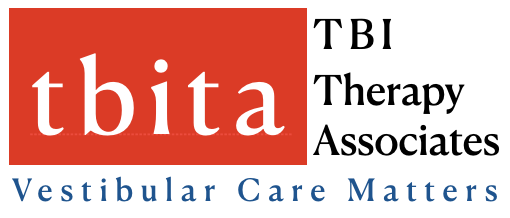.png)
DIZZINESS IN TBI
Vestibular Conditions in TBI
Traumatic Brain Injury (TBI) can lead to a range of vestibular conditions, significantly impacting a patient’s balance, spatial orientation, and overall quality of life. The balance system, which includes the vestibular system, vision, proprioception, brainstem, and cerebellum, is often compromised in TBI, resulting in various debilitating symptoms.
Common Vestibular Conditions Associated with TBI
Benign Paroxysmal Positional Vertigo (BPPV): One of the most common vestibular disorders following TBI, BPPV occurs when tiny calcium crystals in the inner ear become dislodged and enter the semicircular canals, causing vertigo. BPPV leads to sudden episodes of dizziness or spinning, particularly when changing head positions, such as looking up, lying down, or turning over in bed.
Post-Traumatic Meniere’s Disease: This condition may develop after TBI and is characterized by episodic vertigo, fluctuating hearing loss, tinnitus, and a sensation of fullness in the ear.
Labyrinthine Concussion: Trauma to the inner ear or vestibular nerve can result in a labyrinthine concussion, causing acute vertigo, hearing loss, tinnitus, and imbalance, often occurring immediately after the injury.
Vestibular Nerve Concussion: Trauma to the VIIIth cranial nerve can lead to dizziness, vertigo, and unsteadiness. In some cases, this can affect both sides, causing bilateral vestibular hypofunction.
Perilymph Fistula: A tear or defect in the membranes separating the middle ear from the inner ear can cause perilymph fluid to leak into the middle ear, resulting in dizziness and imbalance.
Post-Traumatic Vestibular Migraine (VM): TBI can trigger vestibular migraines, a type of migraine associated with vestibular symptoms. VM is characterized by vertigo, imbalance, motion sensitivity, and typical migraine headaches, often triggered by head movements or visual stimuli.
Chronic Subjective Dizziness (CSD)/Persistent Postural-Perceptual Dizziness (PPPD): PPPD is marked by persistent dizziness and unsteadiness, often exacerbated by complex visual environments or active movements.
Central Vestibular Disorders: Damage to the central vestibular pathways in the brain following TBI can lead to central vestibular and balance issues. Typical symptoms include dizziness, imbalance, coordination difficulties, and problems with vision and spatial orientation.
